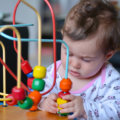It’s safe to say that most parents have an ideal scenario in mind when they think about their baby’s future, whether it’s them graduating from high school with straight As, getting accepted into a prestigious Ivy League college, or becoming an expert in their field.
Contents
If you have an infant at home or are soon to be expecting one, you’ve probably been exposed to the media and marketing campaigns that promise that a certain new toy, book, or video is the one-size-fits-all solution to raising a mini genius.
It’s a common misconception that traditionally ‘educational’ learning techniques are the most beneficial when trying to improve your baby’s intelligence.
However, this is not entirely true. Here you will find tips on how to raise a smart baby that will help parents create the best opportunities for growth and development of their child.

It has been suggested by parenting experts and neuroscientists alike that the best gateway for opening up your child’s neurological potential is by being a nurturing parent.
This is a lot more beneficial than plonking your little one in front of the television set to watch an ‘educational’ TV show or allowing them to fondle aimlessly with complicated toys.
The first five years of a baby’s life are crucial for essential brain wiring through learning. When a baby is first born, their brain is pre-wired for only survival functions such as breathing and regulating a heartbeat.
But in modern society, survival in the real world takes a lot more than this. So if you want your child to stand out in school, become a high-achiever, and have ample opportunities in life, be sure to read on as we provide some tips for raising a little Einstein.
What You Should Avoid
Before diving head-first into the ways in which you can improve your baby’s intelligence, it’s important to outline what not to do.
- First and foremost, it’s imperative that you do not plunge into parenting with the intention of molding a little genius. Although you may think you are helping, it’s easy to get carried away and put an unhealthy amount of pressure on your child.
As a parent, you’ll need to support your child with love and praise, even when they fail. If there’s a substantial amount of academic pressure put upon a child at a young age, they’re far more likely to develop mental health issues in the future and it could affect their self-esteem as well as their relationship with others. - Do not go into raising a child with expectations of grandeur and success, this will only lead to disappointment. Try to remember that you’re blessed to have a happy and healthy baby and not everyone gets the same opportunity.
It’s not the end of the world if your kid doesn’t get into college, but if you condition them to believe that academic success is the pinnacle of all success, it’s going to feel like the end of their world. Allow your child to make mistakes and fail a test or two, they will grow from it. - Do not try to live vicariously through your child. This is a common mistake that leads to a lot of problems. Before reading on, ask yourself why you’re so determined to ensure that your child attains success. Is academic achievement your dream? Are you compensating for something?
Burdening your children with your own pipe dream is a dangerous route to take. Intelligence doesn’t necessarily mean being a scientist or a big-shot lawyer, it is subjective. Your child may be more creative or more sporty and physical.
Nurture, and respect your child’s interests as they grow rather than imposing yours on them.
Tips on Raising A Smart Baby
Now that you know what to avoid, it’s time to take a look at some things that can help.
Some are easier than others, but all are worthwhile when trying to preserve and develop your baby’s cognitive abilities.

- You can begin to make a difference in your baby’s brain before they’ve even been born. That’s right, those with a bun in the oven can encourage their positive neurological development before ever meeting them.
You must avoid any substances while you are pregnant that are known to be harmful to a fetus. This includes tobacco, alcohol, and most drugs that aren’t prescribed by a healthcare professional.
If you’re unsure how some chemicals can affect your baby’s brain or health in general, always consult your doctor or the product manufacturer to check if it’s safe for use during pregnancy.
Some studies have shown that consuming extra folic acid and fish oil during pregnancy can have positive effects on your baby’s brain health, so try to squeeze these into your diet. - Arguably the most important tip on this list is to be loving. This may seem obvious, but many parents are unaware of the colossal impact love, care and attention can have on a baby’s tiny brain.
A study undertaken at the Washington University School of Medicine in St. Louis, Missouri, using brain images reveals that a mother’s love physically affects the volume of her baby’s hippocampus. Children of nurturing mothers had hippocampal volumes 10% larger than those whose mothers are not nurturing.
Hippocampus is the brain region important for learning, memory, and stress responses. Your love and attention will make your baby feel safe and secure which will make them more likely to let their guard down. This in turn encourages them to be curious and explore their surroundings, therefore making them more likely to learn. - You’ve probably heard it before, but you’re about to hear it again. Breastfeed your baby. Doctors have been saying it for years and it’s the oldest advice in the parenting books. If you’re able to breastfeed your baby, do consider it.
The scientific evidence of the benefits of breastfeeding is overwhelming. When you breastfeed your baby, its needs are being met and it feels cared for and loved.
As well as this, breastmilk is a miracle substance with lots of vitamins and healthy fats that are great for furthering your child’s cognitive development. A baby’s brain is around 60% fat and breastmilk typically has a 40-50% fat content, making it the perfect food to literally grow your baby’s brain. - This next one may sound bizarre, but consider reading to your child from birth. Yes, from birth. This may sound pointless as your baby certainly won’t be able to understand what you’re saying, but it sets a bonding routine for you and your baby straight away.
Over time, your baby will pick up on intonations and tone which will likely improve your child’s communication skills and master their literacy skills at a young age.
A 2019 study published in the Journal of Developmental & Behavioral Pediatrics found that kids who are read to every day are exposed to around 78,000 words each year—over five years, that adds up to 1.4 million words heard during storytime.
Even just chatting to your kid can improve their brain! It’s been found that there is a direct link between how many words a baby hears per day and how good their language skills are.
One study found that babies whose parents spoke to them a lot scored higher on standardized tests when they reached age 3 than children whose parents weren't as verbal. - Some academic studies have found that allowing or encouraging naptime after learning or play helps children to retain information.
Peace and quiet as well as a smart child? Yes, please! - A huge factor in brain development is communication and interaction with other people. Babies learn a lot of key characteristics from interacting with others, such as love and empathy.
You can broaden your baby’s horizons by simply having frequent visitors, family members that occasionally babysit, or even by just attending mother and baby groups so that your child is getting adequate healthy interaction with others.
As a parent of a five-year-old inquisitive boy, I have gained a lot of experience finding fun activities and toys to help him understand science and understanding our world in general. On this blog, you’ll find an extensive amount of tutorials, guides, and toys about Science, Technology, Engineering, and Math based on my personal experience to help your child develop critical STEM skills.






